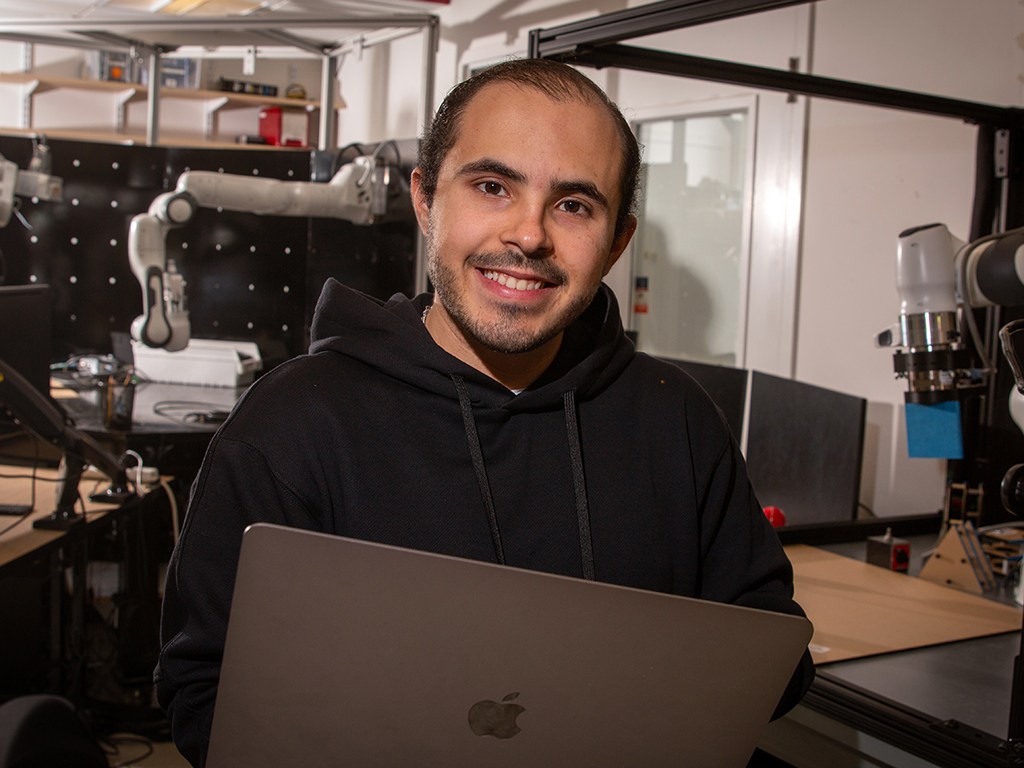Protecting machine learning datasets
Student Spotlight: Bernardo Aceituno SM ‘20
Bernardo Aceituno has always been fascinated by machine learning. As an undergraduate student in his hometown of Caracas, Venezuela, he spent most of his free time working on projects that involved artificial intelligence and robotics.
“I always felt very passionate about exploring the frontier of machine learning technology, so I started looking at how mathematical models could be used to embed logic into robotics,” says Aceituno.
This passion brought Aceituno to graduate school at MIT’s Department of Mechanical Engineering, where he joined Associate Professor Alberto Rodriguez’s team at the MCube Lab. There, he worked on developing model-based methods for robotic manipulation. These methods could help a robot touch, grasp, or move an object.
“It seems like such an easy problem, pushing or flipping a cube. But robots struggle to solve problems that are so intuitive for us humans,” he adds.
After graduating with his master’s degree, Aceituno spent a summer interning for Meta’s Facebook AI Research group. He developed a machine-learning pipeline that aimed to teach robots how to move and manipulate objects on their own, a project the built upon for his PhD thesis.
During his doctoral studies, Aceituno has been building a mathematical frame workfor robotic manipulation that accounts for uncertainty. While working on his thesis, he started to feel a pull toward entrepreneurship.
“Bernardo has always had an itch to do things differently and try new things,” says Rodriguez, who serves as Aceituno’s advisor. “Every time that we chat, he bringsa new idea or a new story to the table.”
Aceituno and his friend, Antoni Rosinol SM’18, a graduate student in MIT AeroAstro, started brainstorming ideas that solved practical problems outside of the lab. They joined MIT Fuse, a micro-accelerator program organized by the Martin Trust Center for MIT Entrepreneurship.
At MIT Fuse, Aceituno and Rosinol met Melissa McAneny MBA ’22, then a student at the MIT Sloan School of Management and a former SpaceX engineer. The trio originally set out to develop an automated warehouse system that enabled smaller e-commerce companies to fulfill same-day delivery orders, similar to Amazon. The team named their startup Stack, and were accepted into the Martin Trust’s 2021“delta v” program.
While visiting warehouses and potential customers, Aceituno and his team realized there wasn’t a viable market for their automated warehouse solution. Instead, they pivoted to another problem that was becoming ubiquitous in industry: managing and protecting datasets for machine learning.
The machine learning model the team developed for their original warehouse solution was built using thousands upon thousands of images and datapoints. Aceituno, Rosinol, and McAneny stored this data on platforms like Google Drive and DropBox. These platforms, which are used by many machine learning teams, fail to track changes to data and user access. There was no elegant solution for keeping track of data and user changes, so the team decided to develop one.
Stack was reimagined as a developer toolthat helps machine learning teams manage and control the data that will be used to train their models. It gives these teams the complete history of their data sets.
“Risking your datasets is risking your business. Teams frequently change, overwrite, and reformat their data, and currently, they resort to email and backups to troubleshoot their datasets. This process risks hundreds of thousands of work hours and revenue every year,” explains McAneny, who serves as Stack’s Chief Operating Officer.
Stack is a storage agnostic platform that provides machine learning teams with a central list of datasets, a map of where each dataset is located, and information on any changes to the data.
According to Paul Cheek, Executive Director of the Martin Trust Center at MIT, the pivot from warehouse automation to dataset management company saved the Stack team two of the most valuable resources for entrepreneurs: time and money.
“In identifying a new market opportunity, the Stack team improved their odds of success by narrowing their focus on one potential beachhead market, rather than splitting their time and attention across multiple potential markets,” adds Cheek.
Having spent his entire academic career focused on machine learning, Aceituno has a ground truth in the needs of Stack’s customers.
“We understand the market really well, because we are the market,” says Aceituno.
The team has done extensive market research. As they prepare to launch a beta version of their platform, they are targeting medium-sized machine learning team sat startups in life science and computer vision fields.
Launching Stack in beta isn’t the only milestone Aceituno is preparing for this fall. He is gearing up to defend his doctoral thesis. After graduating, he will serve as Stack’s CEO full time, working to get it to market.
With his time at MIT coming to a close, Aceituno has been reflecting on the community he found here. As a former president of GAME – the Graduate Association of Mechanical Engineers – and an active member of MIT’s Latin Graduate Student Association and MIT Hillel, a community of Jewish students, Aceituno has surrounded himself with a network of peers who cheered him on throughout graduate school.
“This was my first time living in the U.S. and MIT has been such a welcoming community,” he says. “It is an amazing place to take everything you’ve learned and put it into practice. Whether you want to start the next big research project or launch a startup, there are resources for you to do it and like-minded people who can join you.”

